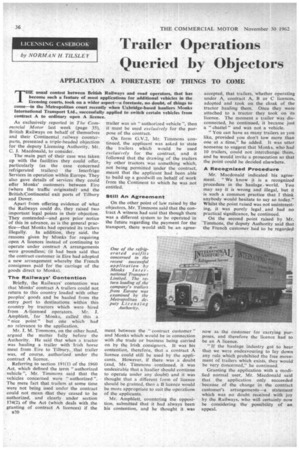Trailer Operations Queried by Objectors
Page 38

If you've noticed an error in this article please click here to report it so we can fix it.
APPLICATION A FORETASTE OF THINGS TO COME
THE usual contest between British Railways and road operators, that has become such a feature of most applications for additional vehicles in the licensing courts, took on a wider aspect—a foretaste, no doubt, of things to come—in the Metropolitan court recently when Uxbridge-based hauliers Monks International Transport Ltd., successfully applied to switch certain vehicles from contract A to ordinary open A licence.
As exclusively reported in The Commercial Motor last week (page 35), British Railways on behalf of themselves and their Continental railway counterparts, presented a triple-headed objection for the deputy Licensing Authority, Mr. C. J. Macdonald, to consider.
The main part of their case was taken up with the facilities they could offer, particularly (as the case concerned refrigerated trailers) the Interfrigo Services in operation within Europe. They also gave details of services they could offer Monks' customers between Eire (where the traffic originated) and the British/Continental exit ports of Tilbury and Dover.
Apart from offering evidence of what the Railways could do, they raised two important legal points in their objection. They contended—and gave prior notice of this in advance, as is the general practice—that Monks had operated its trailers -illegally. In addition, they said, the reasons given by Monks for requiring open A licences instead of continuing to operate under contract A arrangements were groundless; (it had been said that the contract customer in Eire had adopted a new arrangement whereby the French consignees paid for the carriage of the goods direct to Monks).
The Railways' Contention Briefly, the Railways' contention was that Monks' contract A trailers could not return to this country loaded with other peoples', goods and be hauled from the entry port to destinations within this country by tractors which were hired from A-licensed operators. Mr. J. Amphlett, for Monks, called this a "nice point" but one which had no relevance to the application.
Mr. J. M. Timmons, on the other hand, argued the matter fully before the Authority. He said that when a tractor was hauling a trailer with Irish horse meat from Eire to Tilbury, that trailer was, of course, authorized under the contract A licence.
Referring to section 191(1) of the 1960 Act, which defined the term "authorized vehicle ", Mr. Timmons said that the vehicles concerned were "authorized ". The mere fact that trailers at some time were not being used under the contract could not mean that they ceased to be authorized, and clearly under section 174(2 of the Act (which deals with the granting of contract A licences) if the a20 trailer was an " authorized vehicle ", then it must be used exclusively for the purpose of the contract.
On form G.V.2, Mr. Timmons continued, the applicant was asked to state the trailers which would be used exclusively for the contract, and it followed that the drawing of the trailers by other tractors was something which, not being permitted under the contract, meant that the applicant had been able to build up a goodwill on behalf of work from the Continent to which he was not entitled.
Still An Agreement• On the other point of law raised by the objectors, Mr. Timmons said that the contract A witness had said that though there was a different system to be operated in the future regarding the payment for the transport, there would still be an agree ment between the "contract customer" and Monks which would be in connection with the trade or business being carried on by the Irish consignors. It was his contention, therefore, that a contract A licence could still be used by the applicants. However, if there was a doubt (and, Mr. Timmons continued, it was undesirable that a haulier should continue to operate under any doubt) and it was thought that a different form of licence should be granted, then a B licence would be more appropriate to suit the operations of the applicants.
Mr. Amphlett, countering the opposition, submitted that it had always been his contention, and he thought it was accepted, that trailers, whether operating under A, contract A, B or C licences, adopted and took on the cloak of the tractor hauling them. Once they were attached to a tractor they took on its licence. The moment a trailer was disconnected, he continued, it became just a " chattel " and was not a vehicle.
"You can have as many trailers as you like, provided you don't tow more than one at a time," he added. It was utter nonsense to suggest that Monks, who had 10 trailers, could not interchange them, and he would invite a prosecution so that
the point could be decided elsewhere.
A Recognized Procedure Mr. Macdonald indicated his agreement. "We know it is a recognized procedure in the haulage . world. You may say it is wrong and illegal, but it is such a common practice that I think anybody would hesitate to say so today." Whilst the point raised was not uninteresting, it was purely legal , and had no practical significance, he continued.
On the second point raised by Mr. -Timmons, the deputy Authority said that the French customer had to be regarded
now as the customer for carrying purposes, and therefore the licence had to be an A licence.
"If the haulage industry got to hear that we were endeavouring to lay down any rule which prohibited the free movement of trailers which exists, they would be very concerned," he continued.
Granting the application with a modified normal user, Mr. Macdonald said that the application only succeeded because of the change in the contract customer's arrangements—a statement which was no doubt received with joy by the Railways, who will certainly now be considering the possibility of an, appeal.




































































































